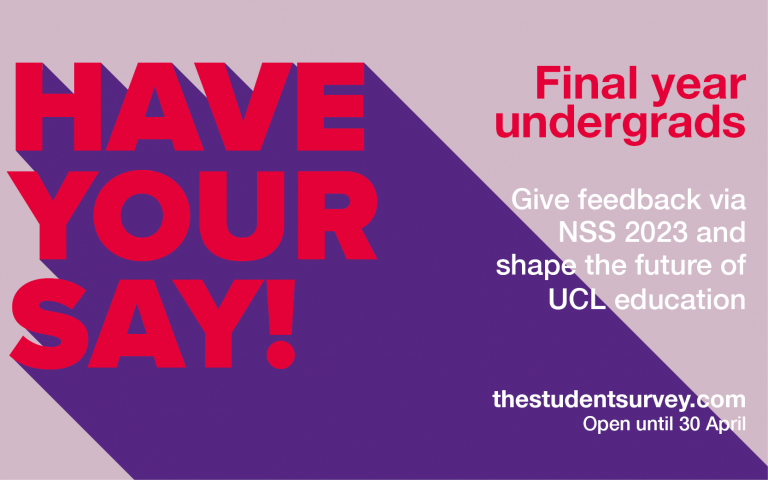Why NSS 2023 matters for UCL education
24 January 2023
The National Student Survey (NSS) is a vital source of insights into education and the student experience at UCL and beyond.

The NSS is an annual online survey for final year undergraduates across the UK, organised by Ipsos MORI on behalf of the Office for Students (OFS).
The 2023 edition of the survey runs from 11 January to 30 April, and students can complete the questionnaire directly via www.thestudentsurvey.com. Ipsos MORI will be contacting eligible students via email from 12 January.
The survey takes around 15 minutes to complete. All student responses to the survey are anonymous and any references to individuals in open text comments are also removed.
Why does the NSS matter to UCL?
Results and comments from the National Student Survey continue to be instrumental in shaping policies and guiding improvements in UCL departments and support services, for the following reasons:
Universities across the UK participate in the survey, enabling comparisons – The National Student Survey is a nationwide survey canvassing final year undergraduates on the experience of their programme and institution. All English HEIs use the same questionnaire, has been updated following an OFS review. The results are published nationally and this helps UCL gauge how we are performing in comparison to our peers.
Institutions require a response rate of at least 50% in order for results to be published, so comparisons between institutions, as well as UCL’s own programmes, are based on stable sample sizes.
In last year’s National Student Survey, UCL achieved a response rate of 71% with over 3,500 students completing the survey.
Authentic and credible student feedback
The NSS provides authentic and credible student feedback to inform policy and drive improvements – Feedback from the NSS and other student surveys can help faculties, departments and support services identify what is working well and where we can improve. NSS feedback is entirely confidential, meaning students can share their views honestly and openly. Results from the survey will be released in July 2023.
You can find examples of changes inspired by previous student feedback on the You Shaped UCL pages.
Free text comments inform and guide changes via Faculty Education Plans – As well as quantitative results, departments and support services will receive open text comments from students participating in the NSS, in response to the final question ‘Looking back on the experience, are there any particularly positive or negative aspects you would like to highlight?’.
Comments in response to this question can be valuable in highlighting issues and best practice that might not be apparent in quantitative results.
These Comments along with the numerical scores have already contributed to Faculty Education Plans and will feed into Departmental Education Plans from summer 2023, to help guide changes in education and student experience.
NSS results contribute to Teaching Excellence Framework ratings – Results from the NSS contribute to the assessment of a HEI’s rating (Gold / Silver / Bronze) in the Teaching Excellence Framework. Results from the survey also contribute to university league tables.
 Close
Close

